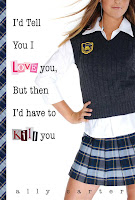STATUS: Fun picture of the week. My cousin was in Washington D.C. with her family and they visited the International Spy Museum and guess what they found in the gift store there? It just tickled us pink.
What’s playing on the iPod right now? WATCH YOUR STEP by Anita Baker
As y’all know, I’ve been working on a lot of contracts lately. One contract was with a new publisher (Macmillan) that I had never sold a book to before so there’s just a lot of extra negotiation necessary to hammer out the boilerplate.
When I started reading the contract for the first time, I was pleasantly surprised at how normal it was. There were lots of elements already included that normally we would have to request and fight for. But it wasn’t so…until page 16 when I reached the Competitive Works clause.
I think my jaw dropped open and stayed that way for a good 15 minutes. I even rang up my contracts manager because I couldn’t believe how aggressive it was. Until this moment, I had never seen a publisher contract where the Competitive Works clause was more than one short paragraph.
CW, by the way, is where the publisher tries to limit what other books an author is allowed to write while working with this publisher. Needless to say, as an agent, I’m pretty aggressive in removing a lot of elements to this clause or adjusting them appropriately because if you don’t, it can really interfere in how an author can write for a living.
This clause had four sub-paragraphs in it, each one worded slightly differently but amounting to the same thing.
My fav is this one, “the Author will complete the Work and submit it to the Publisher prior to beginning work on any other book for INSERT GENRE (excluding only other books that may already be under separate contract to the Publisher).”
My goodness. And then there were three more paragraphs…
Uh, that will need to be changed.

